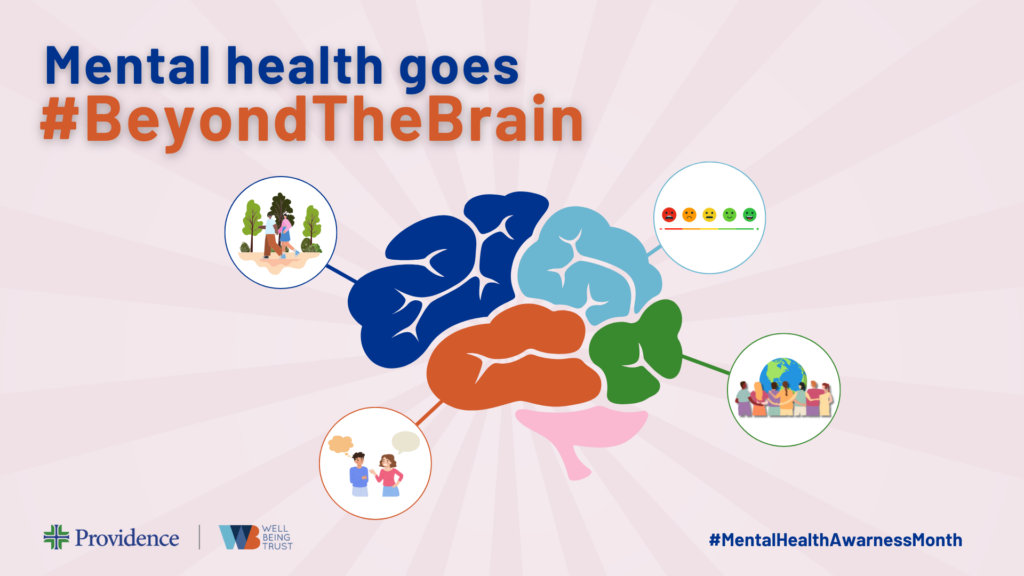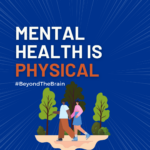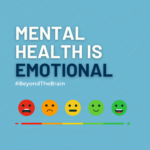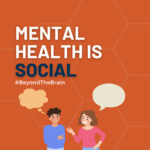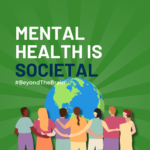For Mental Health Awareness Month 2025, Providence’s Well Being Trust is exploring how our mental health, and the care and support we give it, goes beyond the brain.
Mental health transcends the boundaries of just our cognitive functions – it is deeply intertwined with physical, emotional, and social conditions, including social determinants of health. Simply put, mental health is more than mental.
By exploring mental health beyond the brain, and amplifying how physical, emotional, social, and societal factors shape it, we can empower ourselves, and others, to proactively care for our mental health, regardless of whether we’re seeking support and interventions from a medical provider*. Proactively supporting your mental health is possible in more ways than you may think!
*This information is not intended to be medical advice or to replace any existing care plan established with your personal health care provider(s).
Mental Health is Physical
Physical and mental health are deeply connected, and research indicates that change in one, positive or negative, can lead to change in the other. This makes physical interventions a crucial component in mental health care, as more physical activity, better nutrition and sleep, and lower stress levels, can lead to better mental health.
Many physical health interventions are accessible in small doses, and it doesn’t take much to start mentally caring for yourself in physical ways!
Physical Activity and Movement
Daily physical activity can reduce symptoms of anxiety and depression, and it doesn’t have to entail activities that take much time. It can simply be walks around the neighborhood, stretching or yoga, or even playing with your kids. The key is reducing sedentary behavior – a common cause for many physical ailments that can lead to mental health problems.
Nutrition
Thinking and feeling what we eat is very real, and like physical activity, small changes can make a noticeable difference in how we feel mentally. Simple switches like drinking more water and incorporating more vitamins, minerals, healthy fats, and fiber into a diet with all food groups can set you up for success on your care journey. Nutrition likely won’t alleviate mental health struggles on their own, but it can be a valuable part of getting you there!
Stress
Stress isn’t avoidable, but prolonged stress can lead to numerous physical health issues. Coping mechanisms to alleviate stress should be a common tool in your mental health toolbelt. Moving your body is a great stress alleviator, but for those with busy schedules or limited time on busy days, deep breathing is a reliable, quick tactic to use as you need. Box breathing is accessible everywhere and is utilized by U.S. Navy SEALs.
Mental Health is Emotional
Understandably, mental and emotional health are often confused with one another, but there are distinct differences between them:
“An easy way to think about mental and emotional health is mental health refers to all aspects of our mental well-being and emotional health is one of those pieces,” said Ryan Dix, PsyD., clinical director for Providence’s Well Being Trust.
“Mental health is comprised of how we feel, identify and deal with our emotions, our resiliency, decision-making and psychological and social well-being. Emotional health focuses just on that first part, meaning how we feel, identify and cope with our emotions.”
‘Being emotional’ is a framing that has carried negative connotations for all genders in their unique way, but positive emotional health is key for self-esteem, confidence, mindfulness, and empathy, which in turn can lead to a more positive mental health standing.
Self-Compassion
Self-compassion is about using the same compassion we show to others on ourselves. Giving ourselves grace by being self-compassionate can lead to better mental and overall health outcomes and has been shown to be one of the most powerful sources of coping. Recognizing and working to change your critical self-talk or thinking about how you would treat a friend or family member in the same situation as you are wonderful self-compassion techniques.
Mindfulness
It can be easy to lose ourselves in the daily shuffle, which can lead to overwhelming feelings of questioned purpose and self-worth, as well as comparing ourselves to others. Mindfulness is a practice in which being present is the key. Meditation is just one of numerous mindfulness exercises, which allows the processing of feelings without judgement, letting them subside, and moving forward with your day.
Creative Expression
A 2023 survey from the American Psychiatric Association found Americans who rate their mental health as very good or excellent tend to engage in creative activities, such as playing the piano, crocheting a blanket, dancing with friends or solving crossword puzzles, more frequently than those who rate their mental health as fair or poor. Creativity is a fantastic outlet for externalizing emotions in a constructive way. You may feel vulnerable or self-conscious, but there’s nothing wrong with creative expression happening in a room with just yourself.
Mental Health is Social
It’s important we take necessary, reasonable, and achievable measures to support our own mental health, but the importance of social connection on our well-being can’t be understated. Former U.S. Surgeon General Dr. Vivek Murthy listed social connection among his top public health priorities, as loneliness is a risk factor for mental health conditions like depression and stress and isolation increases the risk for premature mortality by 29%.
“We aren’t meant to exist in isolation,” said Arpan Waghray, MD, CEO of Providence’s Well Being Trust. “Our mental health greatly benefits from having people around us that we love and connect with, and who offer their love and connection in return. Independence and knowing your social capacity are important, but connection can’t be ignored when talking about mental health.”
As we navigate life, recognizing opportunities for connection, and taking them, are critical for our mental health.
Family/Friendships
We can all get by with a little help from our friends…and family. These connections have shown to predict well-being and can help protect against mental health issues such as depression and anxiety, while offering numerous positive benefits. Connecting with friends and family can be as simple as a dinner, game night (or different group activity) or even a video call.
Work
Our careers are just as much about connection to each other as connection with the work itself. This has proven apparent in the rise of remote work opportunities as a result of the COVID-19 pandemic. Remote work has been key for worker flexibility and work-life balance but for some can lead to increased feelings of isolation due to less face-to-face time. Prioritizing on the job connection (i.e. collaborative projects, team building activities) or off the job connection (happy hours or non-work events, even virtual ones!) can help employees feel less isolated and more satisfied, leading to better employee mental health.
Community
Connectedness to the community you live in can create camaraderie with others who share similar interests and passions. Whether it be places of worship, local associations for volunteering, community events, or even recognizing the same people at your local grocery store or coffee shop, this community connection can give a sense of being part of something bigger than yourself.
Mental Health is Societal
World events, climate change, socioeconomic inequities. All these societal aspects, and more, can affect our mental health. It’s our responsibility to mentally care for ourselves, but the work that’s needed to improve mental health across the country requires a societal lens.
One person alone won’t fix any of these issues, but contributing as an individual to an impactful group effort can create a stronger sense of purpose and benefit your mental health, while also helping raise awareness on the need for action in key issues.
Volunteering
Giving back to a cause you care about can benefit your mental health, improve health outcomes, and help nurture lasting connections. Sites like VolunteerMatch can help connect you with opportunities based on your location, areas of interest, and skills you can use to help.
Advocacy
Action does more than no action, and every bit of advocacy toward a cause you care about helps create a greater chance for change. Calling your local and national representatives or attending in-person events and State Capitol visits are great ways to contribute. Advocacy is key for helping enact policies around climate control, health equity and mental health access.
Media Consumption and its Impact
Being informed on important issues allows us to understand what’s happening and how we can help, but the means of being informed – social media and news in particular – can be inundated with misinformation, hate speech, and harmful ideologies. Recognizing when we’re consuming media to the point of harming our mental health, and when to take a break from it, helps us avoid burnout and apathy.
Combinations of These Components
Oftentimes, one of the four components above is done in conjunction with another. As you begin or continue prioritizing your mental health, these combinations can help fast track the whole person health benefits you can receive. Examples of these activities, some of which have already been mentioned, include:
- Joining a recreational sports team or club (Physical and Social)
- Taking a dance lesson (Physical and Emotional)
- Doing a group art activity (Emotional and Social)
- Volunteering for a local cause (Social and Societal)
- Participating in a local march (Depending on the cause, possibly all four components)
Whole Person Health is Key
Mental health is impacted by all these components, and these components are all impacted by mental health. This is what makes each of them parts of our whole person health.
According to the National Institutes of Health, whole person health “involves looking at the whole person—not just separate organs or body systems—and considering multiple factors that promote either health or disease. It means helping and empowering individuals, families, communities, and populations to improve their health in multiple interconnected biological, behavioral, social, and environmental areas.”
The more we make whole person health a commonplace care model, the more we’ll understand what we need to be our happiest and healthiest selves.
Getting Started
If this all seems intriguing, yet overwhelming, it’s completely understandable! The array of possibilities can be a lot to process, and you shouldn’t feel beholden to implementing a great amount of change at once. In fact, research shows that starting small is better for creating long-term change than starting big.
Start with an action that feels accessible and stick with it until you’re ready to add or switch to another. Caring for your mental health takes time, so give yourself grace, try what works, and, most importantly, enjoy it!

